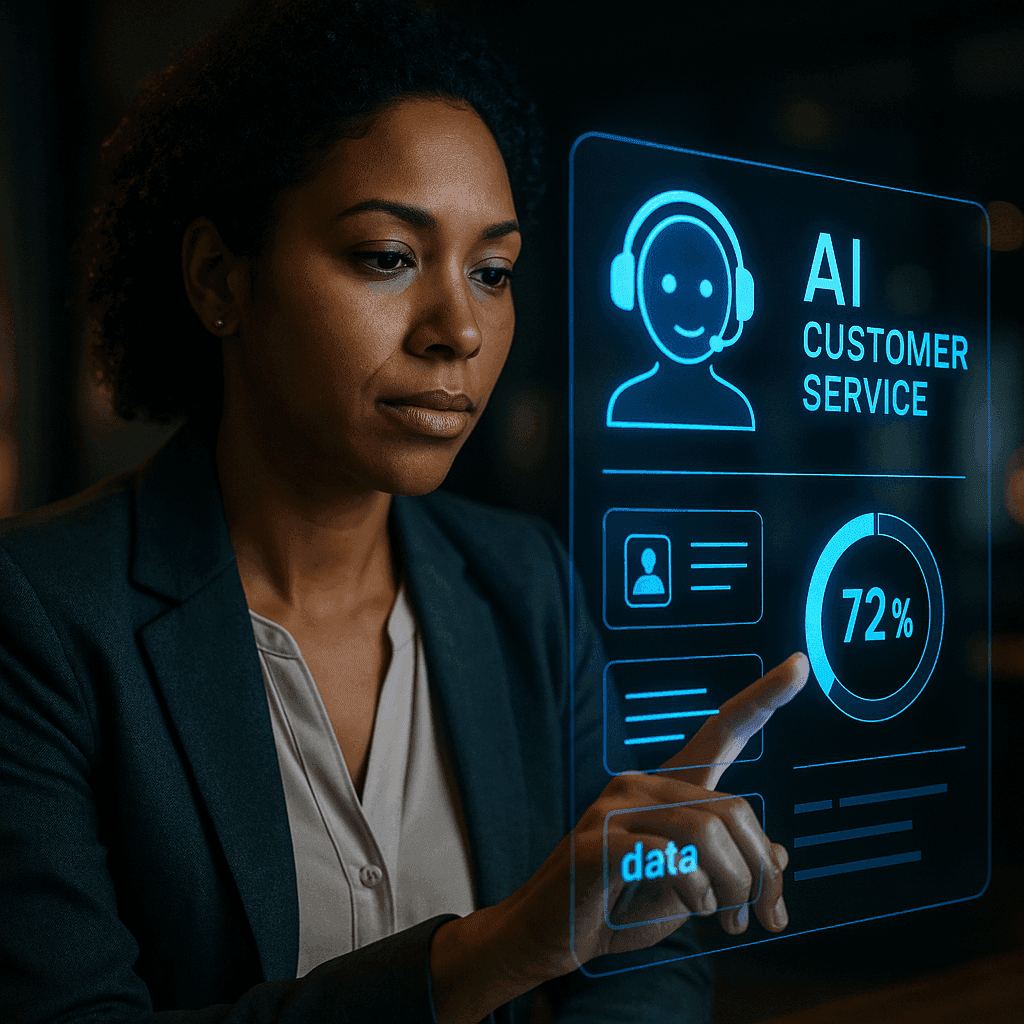AI in 2025: From Sci-Fi Dreams to Business Reality (And What It Means for You)

Remember when talking to your phone felt weird? Now we're casually asking Siri for restaurant recommendations while our Netflix algorithm knows our taste better than our friends do. Welcome to 2025, where artificial intelligence isn't just science fiction—it's the invisible force reshaping how we work, shop, and live.
If you've been wondering whether AI is just another tech buzzword or something that actually matters for your business, here's the short answer: it's as fundamental as electricity or the internet. And if that sounds dramatic, buckle up—we're just getting started.
What Exactly Is AI? (Without the Jargon)
Think of artificial intelligence as teaching computers to do things that typically require human smarts—like recognizing faces, understanding language, or making decisions. It's not about creating robot overlords (sorry, sci-fi fans). It's about building tools that can learn patterns, solve problems, and handle tasks that used to require human intervention.
Here's the current landscape:
Artificial Narrow Intelligence (ANI) powers everything you're already using—from Google Translate to those eerily accurate product recommendations on Amazon. These systems are specialists: brilliant at their specific job, but they can't exactly pivot to writing poetry or diagnosing medical conditions.
Artificial General Intelligence (AGI)—the kind that could theoretically match human reasoning across any domain—remains firmly in "maybe someday" territory. No AGI systems exist yet, despite what certain tech CEOs might tweet at 3 AM.
The AI Toolkit That's Changing Everything
Let's break down the key players in today's AI lineup:
• Machine Learning: The foundation that lets computers learn from data without being explicitly programmed for every scenario • Deep Learning: Uses brain-inspired neural networks to tackle complex challenges like understanding language or recognizing images • Natural Language Processing: Powers chatbots, voice assistants, and that AI writing tool your marketing team is (secretly) experimenting with • Computer Vision: Helps machines "see" and interpret visual data—from medical scans to quality control in manufacturing
The numbers tell the story: over 60% of enterprises have integrated AI into at least one business unit, with some sectors seeing productivity boosts of up to 40%. That's not incremental improvement—that's transformation.
The Game-Changers of 2025
This past year brought us generative AI—systems that don't just analyze data but create original content. We're talking text, images, code, even video. Tools like GPT-4 and Google Gemini are reshaping everything from marketing campaigns to software development.
But here's what's really exciting: AI is getting more accessible. Open-source models and cloud-based services mean you don't need Google's budget to harness AI's power. Small businesses are now automating customer service, personalizing marketing, and optimizing operations with tools that were enterprise-only just a few years ago.
Plus, AI is going mobile. Edge AI—running AI models directly on devices rather than in distant data centers—is expanding possibilities while addressing privacy concerns. Your smartphone can now process AI tasks locally, keeping your data... well, yours.
Real-World Success Stories
Let's get practical. Here's how AI is already making a difference:
Healthcare: AI systems are now matching or beating human experts at reading medical images, catching diseases earlier and enabling more personalized treatments.
Retail: E-commerce platforms using AI for recommendations and dynamic pricing are seeing 20-30% increases in conversion rates. That's real money.
Customer Service: Advanced chatbots are resolving over 80% of routine customer issues without human intervention, freeing up teams for complex problem-solving.
Manufacturing: Predictive maintenance powered by AI analytics has reduced equipment downtime by up to 25% for some companies.
These aren't futuristic possibilities—they're happening right now.
What's Coming Next?
Experts predict AI will continue automating knowledge work across industries. We're talking legal research, financial analysis, creative tasks—areas that seemed immune to automation just a decade ago.
But it's not all smooth sailing. Regulatory scrutiny is intensifying, and rightfully so. Global standards for AI transparency, safety, and fairness are becoming prerequisites for widespread adoption. The companies that get ahead of these requirements will have a significant advantage.
The democratization trend will accelerate too. Expect more user-friendly AI tools that don't require a PhD in computer science to operate effectively.
Your AI Action Plan
So what should your business actually do with this information?
Start small, think big: Experiment with AI tools in low-risk areas. Try automated customer support, content generation, or data analysis.
Invest in your people: AI isn't about replacing humans—it's about augmenting human capabilities. Invest in training and change management.
Prioritize responsible deployment: Focus on transparency and bias mitigation from day one. It's easier to build ethical AI practices than to retrofit them later.
Stay informed about regulation: AI governance is evolving rapidly. Companies that proactively address compliance will avoid painful pivots later.
AI isn't just another technology trend—it's a fundamental shift in how business gets done. The question isn't whether AI will transform your industry, but whether you'll be leading that transformation or scrambling to catch up.
The future is already here. It's just waiting for you to say hello.
More Articles

The CX Revolution: 65+ AI Customer Service Stats You Need for 2025
Explore how AI is rapidly transforming customer service by 2025, from lightning-fast chatbots to hyper-personalization, and why a human touch still matters.

Is AI Taking Over Customer Service? What 2025 Really Looks Like
Explore how AI is reshaping customer service in 2025, from hyper-personalization to autonomous agents, and discover the essential balance between efficiency and the human touch.